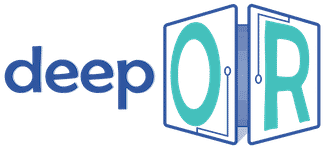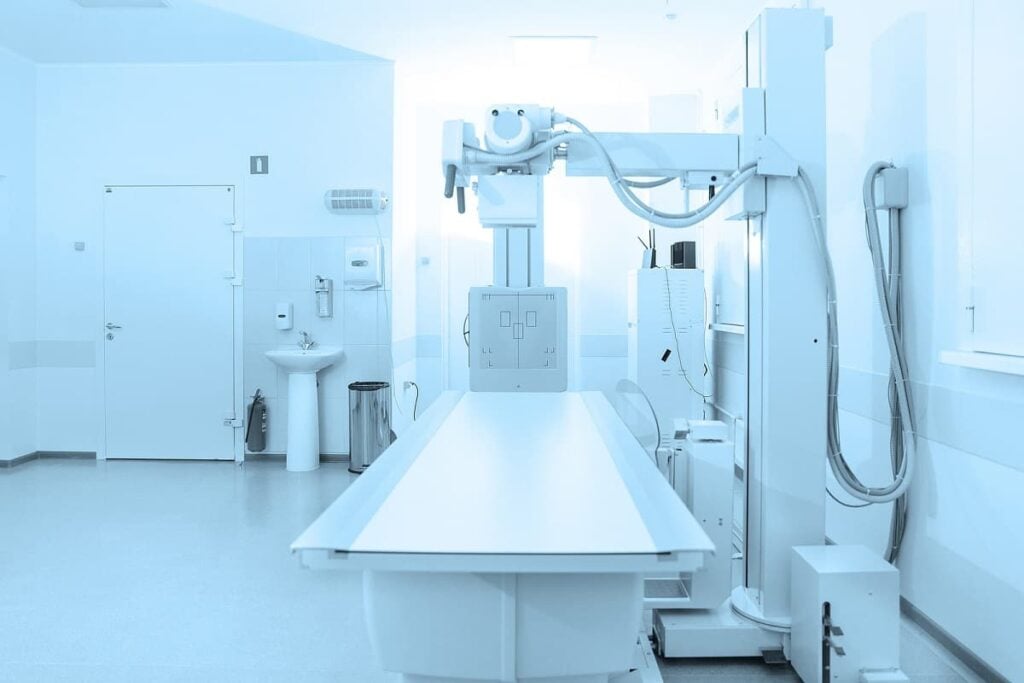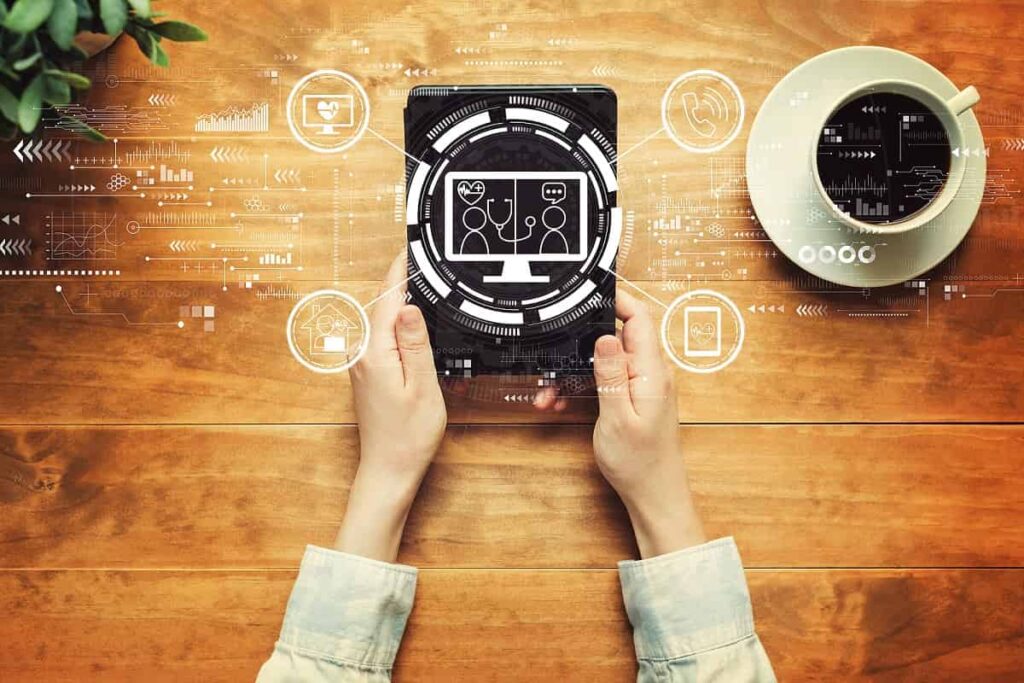10 French Startups Using AI in Healthcare
Table of contents

Many of you have probably been to France, considering that it’s the most visited country in the world. While you were there, you may have noticed that the country is quite large – about the size of Texas, but with far fewer Mexicans. Like Texans, the French are proud of where they come from and will ramble on about it in their funny little accents much to the chagrin of anyone within earshot. This sense of national pride is what made our article on “The Top-10 French Artificial Intelligence Startups” quite popular, and as we promised, we’re going to follow up with an article on some French AI startups in healthcare.
None of the top French AI companies we wrote about last month came from the healthcare sector, which happens to be the cornerstone of Monsieur Macron’s $1.8 billion AI investment program over the next four years. To put together this list, we turned to a website called “France is AI” which has listed 33 companies applying AI to healthcare. Here’s a look at ten of them.
Bioserenity

Monitoring patients outside hospital environments makes data collection cheaper and easier, and more data means more precise diagnostics. In the case of Bioserenity, that translates into 126 million measurements per hour. The data is shared with clinics through a secure cloud platform and interpreted using machine learning algorithms, with feedback then communicated to the patient via a mobile app. The system dubbed Neuronaute is currently running clinical trials in several university hospitals throughout Europe.
Cardiologs
Founded in 2014, Cardiologs has raised $8 million to develop an AI-based cardiac monitoring service. Atrial fibrillation (irregular heartbeats that can lead to blood clots, stroke, and heart failure), is the most common heart problem with 33 million patients worldwide. Traditional screening predicts the condition in only 59% of the cases while the Cardiologs’ neural network, trained using more than 500,000 recordings, predicts the condition 91% of the time. Doctors can upload clinical data as well as data from smartwatches, electrocardiograph (ECG) patches, or connected clothing, and the algorithm only gets smarter over time. Cardiologs received a CE mark and FDA clearance, and their website says the service will be launched to the market “soon”. According to Glassdoor, the average salary for a Cardiologist is $358,646 in the United States. (They’re the ones who only get it right 59% of the time.)
Update 01/10/2020: Cardiologs has raised $15 million in Series A funding to double down on growth in North America and Europe. This brings the company’s total funding to $23 million to date.
Therapixel
Founded in 2013, Therapixel has raised $2 million to develop a touchless medical imaging, image reading and manipulation solution for medical practices. Their Fluid product allows for gesture-controlled image navigation in the operating room that Therapixel claims is ten times more efficient than voice control and more sanitary:
Their other main product called Radvise provides automatic image interpretation in mammography. Breast cancer affects 1 in 8 women during their lifetime and early detection is key with a 5 year survival rate of 99%. Radvise’s AI algorithm improves the rate of false positives by 5%, a feat which won Therapixel the $1.2 million first prize of the 2017 Digital Mammography Challenge organized by the US FDA, IBM Research, and the National Cancer Institute among others. Radvise comes with complementary functions like cloud-based image sharing, voice control, and a dedicated workstation. It’s currently available in beta version for clinics.
Update 03/14/2019: Therapixel has taken in $5.6 million in Series A funding to actively recruit new talent to accelerate development. This brings total funding to $6.3 million to date.
Keen Eye Technologies


(This reminds us of that cool drug discovery startup, Recursion Pharmaceuticals, that actually looks at the physical characteristics of cells to see how they respond to drugs.) Keen Eye’s suite of products includes a workflow management tool and a visualizer as well helping drug researchers, pathology labs, and research academics to share visuals, data, and findings. The product has received ISO certifications, and Keen Eye is currently working on acquiring CE and FDA clearance before they launch to the market. The technology has also received recognition for its use in cervical cancer screening.
Cutii


Features include speech recognition, vocal synthesis, facial recognition, fall detection, alarm management, and Internet of Things capability. While Cutii can’t help with menial tasks (it doesn’t have arms), it can operate autonomously if required, and its monthly subscription package for $110 comes with video activities like cooking, relaxation exercises, yoga, or fitness classes (just in case grandma can’t figure out how to use Youtube).
Babyprogress
Founded in 2014, Babyprogress has raised $800,000 to design a childbirth simulation called SIM37. Their system maps the fetus, its position, and the birth canal using MRI and 3D imaging with a graphical processor (GPU) and assesses the mechanical risks of childbirth with an AI simulation. Parents are informed of risks before the delivery and can make decisions accordingly so the whole process becomes personalized, predictive and preventive. According to Babyprogress, this is the only method that gives parents a safe and personalized risk assessment.
Ultrasound is inefficient at the end of a pregnancy, because the small pelvis bones interfere with the ultrasound waves, X-ray scanning exposes the fetus to radiation, and scanning of the pelvis only gives general results. The examinations are prescribed by a GP or gynecologist and are conducted weekly for 37 weeks before delivery at one of the four MRI centers in Paris. The series of examinations cost $1100 and does not yet have insurance coverage. Babyprogress only operates in France at the moment and does not have an international website.
AI Merging Health
Continuing on the same thread is AI Merging Health. Founded just last year, the company has received undisclosed funding to develop AI algorithms that analyze healthcare databases to predict certain healthcare risks and enable professionals to prevent negative outcomes. Founders Olivier Ami and Christophe Maran are practitioners and researchers in multiple fields of healthcare with experience in computer sciences, AI, and risk management in medicine. Their first working product called Pregnanthee uses a deep learning algorithm to quantify the risk of fetal death or malformation. AI Merging Health has partnered with Babyprogress to support their childbirth risk assessment mentioned above. The team is looking to expand their capabilities to the field of image recognition to expand towards further clinical applications.
Alicante
And speaking of big data, we have Alicante. Founded in 1999, the company has received undisclosed funding to develop an “AI as a service” model for healthcare institutions and clinical research facilities. The AI platform called Inquia, developed by data scientists dedicated to healthcare, is aiming to make sense of all the big data that is accessible to institutions in the sector. Here’s a diagram the company provided in French – because if you can’t speak French then you’re just a boorish lout:
The company is defining and maintaining predictive indicators based on actual customer data that enable the user institution to flag high-risk patients, improve the quality of patient records and save time for the staff. Alicante has joined forces with the French Alternative and Atomic Energy Commission’s (CEA) Tech Research Institute to enhance the Inquia product for their 500-strong client base this April.
Betterise Health Tech


According to the WHO, non-communicable diseases like cardiovascular diseases, cancers, and type 2 diabetes are the leading cause of death (87%) in developed countries, and by changing behavior patterns we can avoid 75% of heart diseases and diabetes and 40% of cancers. The Betterise general health concierge is available in the US, UK, and France and the other apps are French only at the moment. Betterise works with all mainstream wearables and is designed to be open for integration by developers into other health-related services as well. In other news, smoking causes cancer and working too much can be stressful.
DeepOR

DeepOR is harnessing the power of AI to do so; activities in the OR are monitored in real-time, and workflows are automated using AI-based statistical models. DeepOR has won a number of startup accolades including the second prize at the MIT Startup Competition in April 2016. As of yet, there is no launch date published for their service.
Conclusion
France’s $1.8 billion AI investment kills two birds with one stone; successful implementation will mean more opportunities for healthcare reform and will put more French AI healthcare startups like these on the global map – that is if we can convince some of them that having a website in the world’s third most spoken language might be a good way to get some more media attention from this side of the pond.
Sign up to our newsletter to get more of our great research delivered straight to your inbox!
Nanalyze Weekly includes useful insights written by our team of underpaid MBAs, research on new disruptive technology stocks flying under the radar, and summaries of our recent research. Always 100% free.


















